American Faust: From Condi to Neo-Condi is a american film of genre Documentary
American Faust: From Condi to Neo-Condi (2009)
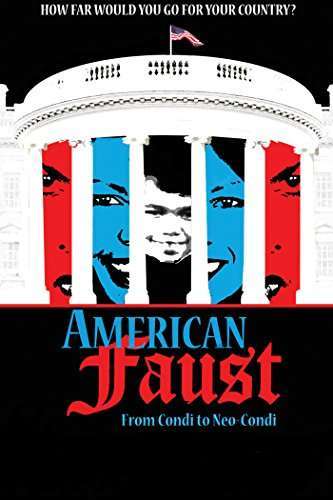
If you like this film, let us know!
- Infos
- Casting
- Technical infos
- Photos
- Videos
- Film quotes
- Characters
- Music
- Awards
Length 1h29
OriginUSA
Genres Documentary
Themes Documentary films about historical events, Documentaire sur une personnalité, Documentary films about politics, Political films
Rating78%










American Faust: From Condi to Neo-Condi is a 2009 documentary film by British filmmaker Sebastian Doggart that portrays the life and career of former US Secretary of State Condoleezza Rice.
Synopsis
The film tells the story of Rice's life from her birth in 1954 to her 2009 departure from office as Secretary of State, and her return to Stanford University. Rice is a key interviewee in the film: she speaks about her roots in racially explosive Birmingham; her short-lived music career; her fascination with Joseph Stalin and Ronald Reagan; her close friendship with George W. Bush; right up to a defense of her record in government. The film gives voice to numerous supporters of Rice, including both Presidents Bush; her stepmother Clara Bailey Rice; Oprah Winfrey (who remarks that "I've never been more proud to say the word W-O-M-A-N than after meeting Condoleezza Rice"); mentor and later critic, Brent Scowcroft; her former fiancé, Rick Upchurch; John McCain who praises her as "a great American"; former Secretary of State Henry Kissinger; Dick Cheney; and Arnold Schwarzenegger.Comments
Leave comment :
Suggestions of similar film to American Faust: From Condi to Neo-Condi
There are 8870 with the same cinematographic genres, 10065 films with the same themes (including 217 films with the same 4 themes than American Faust: From Condi to Neo-Condi), to have finally 70 suggestions of similar films.If you liked American Faust: From Condi to Neo-Condi, you will probably like those similar films :

The Sons of Eilaboun (2007)
, 24minutesDirected by Hisham Zreiq
Origin Israel
Genres Documentary
Themes Films set in Africa, Films about religion, Documentary films about law, Documentary films about war, Documentary films about historical events, Documentaire sur une personnalité, Documentary films about politics, Documentary films about religion, Political films, Films about Jews and Judaism
Rating68%





The film starts with Melia Zreiq, an old woman from Eilaboun, saying: "I hope God will bring peace to this land, and let the peoples live together - a good life. I hope there will be peace". Historian Ilan Pappe talks about Plan Dalet, a plan that David Ben-Gurion and the Haganah leaders in Palestine worked out during autumn 1947 to spring 1948. Pappe discusses the details of the plan, and how was it carried out. On October 30, 1948, the Israeli army entered Eilaboun at approximately 5 AM. They then forced the villagers together in the main square of the village. They chose seventeen young men. Five of them were taken as human shield, and the rest of the twelve were killed, each in a different location. This all happened after the expulsion of the rest of the village to Lebanon, where they became refugees after a five days forced march to Lebanon. After a United Nations peace keeper observed and reported Israel was forced to allow the people back.

Flower in the Gun Barrel (2008)
Origin USA
Genres Documentary
Themes Films set in Africa, Films about racism, Documentary films about racism, Documentary films about law, Documentary films about war, Documentary films about historical events, Documentaire sur une personnalité, Documentary films about politics, Political films
Rating80%





To a large extent, the film consists of interviews with genocide survivors, many of whom were children in 1994. In all, over thirty survivors, perpetrators, and experts were interviewed for the film. In these interviews, the survivors discuss what it means to be a Rwandan and to live next door to people who killed their families. The survivors describe how they deal with their country's request that they forgive one another and move on, so that Rwanda can rebuild and unify itself. Perpetrators' views illuminate the madness that seized the culture in 1994; exploring the experience of apologizing to victims, and examining what it is like to be looked at as a murderer in Rwandan society.
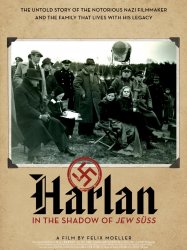 , 1h39
, 1h39Genres War, Documentary
Themes Documentary films about business, Documentary films about the film industry, Documentary films about war, Documentary films about historical events, Documentaire sur une personnalité, Documentary films about politics, Political films, Documentary films about World War II
Actors Veit Harlan, Hilde Körber, Christiane Kubrick, Kristina Söderbaum
Rating68%





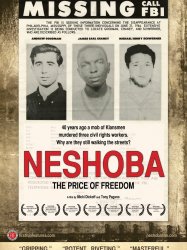
Neshoba (2010)
Genres Documentary
Themes Films about racism, Documentary films about racism, Documentary films about law, Documentary films about historical events, Documentaire sur une personnalité, Documentary films about politics, Political films
Rating76%





Neshoba explores the history and changing racial attitudes of Neshoba County, Mississippi four decades after the murders of James Chaney, Andrew Goodman, and Michael Schwerner during Freedom Summer. The film captures the trial of Edgar Ray Killen, who granted the filmmakers "extraordinary access".
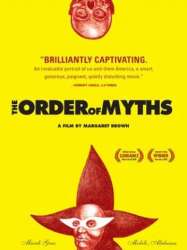
The Order of Myths (2008)
, 1h19Origin USA
Genres Documentary
Themes Films about racism, Documentary films about racism, Documentary films about law, Documentary films about historical events, Documentaire sur une personnalité, Documentary films about politics, Political films
Rating68%





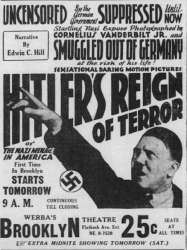
Hitler's Reign of Terror (1934)
, 55minutesOrigin USA
Genres Drama, Documentary
Themes Politique, Documentary films about war, Documentary films about historical events, Documentaire sur une personnalité, Documentary films about politics, Hitler, Political films, Documentary films about World War II
Rating52%





As the picture opens, a re-enacted phone call featuring reporter Cornelius Vanderbilt, Jr. in Germany, and narrator Edwin C. Hill in New York is depicted. Then a parade of people carrying torchlights in Berlin, where Jewish works and other political books are burned. Vanderbilt meets with Hill, and then flies out of the country. Hill talks with Vanderbilt about the problems in his country, then a re-enacted interview between Adolf Hitler and Vanderbilt. During a viewing of World War I battle footage, Hitler's home town, Leonidad, Austria, and his parents' graves are pictured. Vanderbilt goes to Vienna, to see Chancellor Dollfuss, and he films several Austrian Nazi riots during a parade. In a re-enactment, Vanderbilt's passport is stolen, and there are several shots of Nazis abusing Jews. In yet another re-enactment, Vanderbilt interviews Crown Prince Wilhelm, and more books are burned. Helen Keller talks to an interviewer about her books, which were burned by the Nazis. Then a conversation Vanderbilt, Kaiser Wilhelm II in Doorn, Holland, and Prince Louis Ferdinand had is re-enacted. Actual anti-Nazi speeches given by prominent Jews and some Gentiles are shown and the Nazis are shown trying to alter the Bible. In the final scene, Congressman Samuel Dickstein of New York and Hill give speeches directly to the audience, explaining the dangers of Nazism.

Virtual JFK (2008)
, 1h20Origin USA
Genres War, Documentary, Historical
Themes Films about families, Documentary films about war, Documentary films about historical events, Documentaire sur une personnalité, Documentary films about politics, Political films, Alternate history films
Rating69%





VIRTUAL JFK investigates one of the most debated "what if" scenarios in the history of U.S. foreign policy: What would President John F. Kennedy have done in Vietnam if he had not been assassinated in 1963, and had he been re-elected in 1964? The film employs what Harvard historian Niall Ferguson calls "virtual history," assessing the plausibility of counterfactuals - "what ifs" - and the outcomes they might have produced. The heart of the film deals with the question: Does it matter who is president on issues of war and peace?
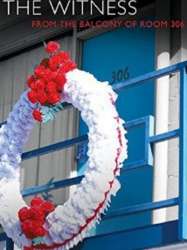 , 32minutes
, 32minutesOrigin USA
Genres Documentary
Themes Films about racism, Documentary films about racism, Documentary films about law, Documentary films about historical events, Documentaire sur une personnalité, Documentary films about politics, Political films
Rating73%





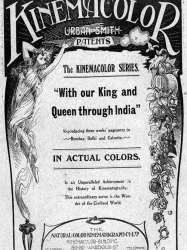
The Pageant Procession (1912)
, 2h30Origin United-kingdom
Genres Documentary
Themes Documentary films about historical events, Documentaire sur une personnalité, Documentary films about politics, Political films, Films about royalty
Rating67%





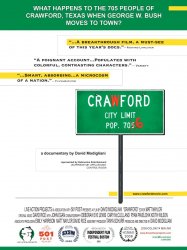
Crawford (2008)
Origin USA
Genres Biography, Documentary
Themes Documentary films about historical events, Documentaire sur une personnalité, Documentary films about politics, Political films
Rating67%





 Connection
Connection